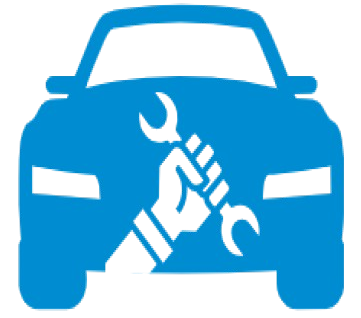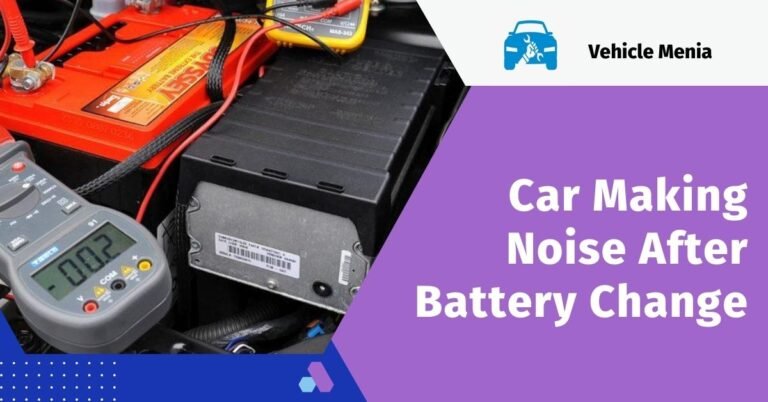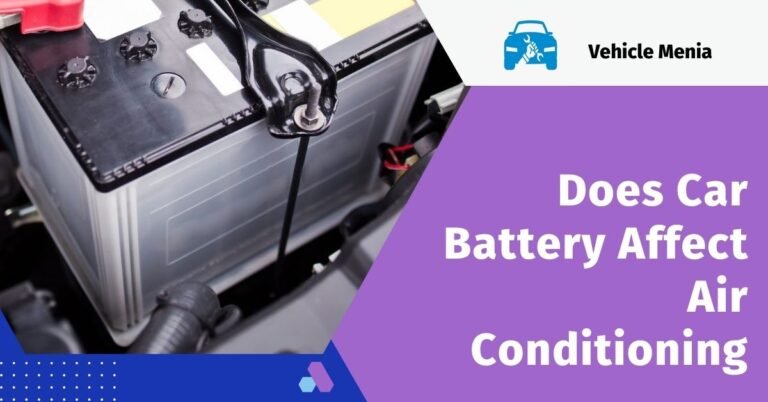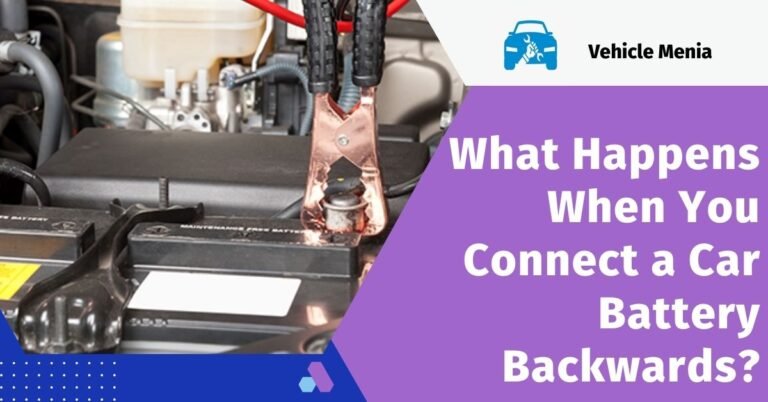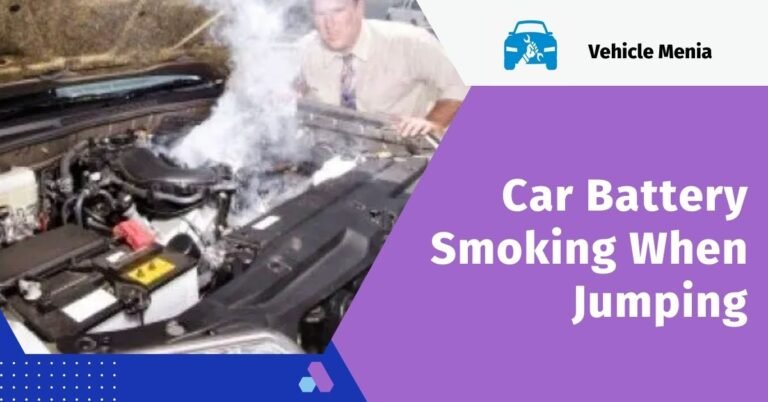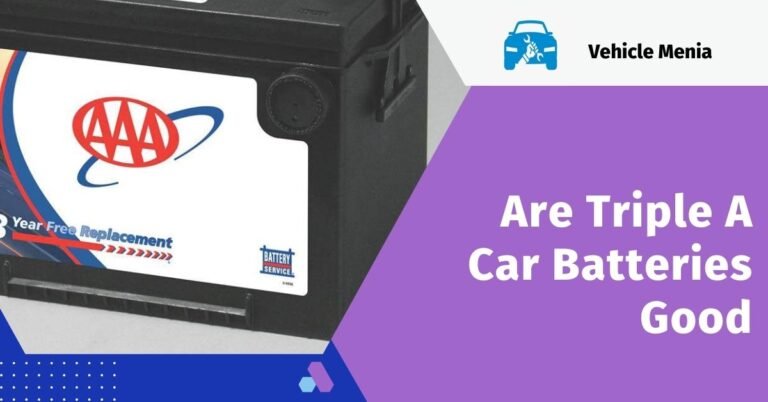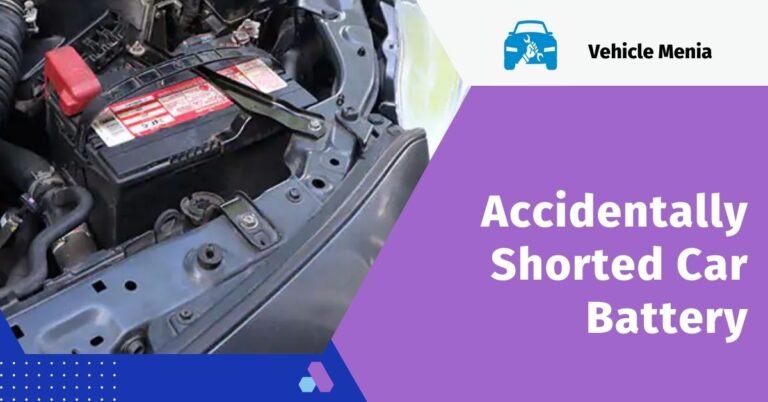There’s liquid in a lead-acid battery, a mix of distilled water and battery acid. The liquid should be above the plates; if not, add distilled water. Sloshing sounds could be due to air in the cooling system, gasket leaks, or a clogged evaporator drain.
Table of Contents
Battery Sounds Like Sloshing Water
The sloshing sound in an automobile battery is normally the shifting of an electrolyte solution that includes a mixture of sulfuric acid and distilled water. This may have happened when the battery was moved or shaken.
Causes of Car Battery Sounds Like It Has Water In It
- Electrolyte Movement: The liquid sound is typically due to the movement of the electrolyte (a mixture of sulfuric acid and water) within the battery cells. This movement can be heard when the battery is shaken, which is normal.
- Overcharging: A fully charged battery would cause too much bubbling because of electrolysis on the electrolyte, which creates hydrogen and oxygen gasses. A hissing, bubbling sound can occur, which might possibly damage the battery.
- Low Electrolyte Levels: If the electrolyte level is low, the remaining liquid can easily slosh around and create noise. Good electrolyte levels are maintained to prevent exposure of the battery plates to air.
- Internal Short Circuit: An internal short may also cause strange sounds like bubbling or hissing. In most cases, it is quite serious and requires the battery to be replaced.
- Age and Wear: As batteries age, many things inside may degenerate, causing different types of noises, like bubbling or sloshing sounds.
How To Fix A Car Battery Sounding Like It Has Water In It?
Electrolyte Movement:
The battery should be securely fastened to limit movement. Avoid unnecessary tilting or shaking. Proper handling will minimize any sloshing of the electrolyte.
Overcharging:
It is also recommended to use an intelligent charger that can regulate the charging voltage and current at any time, thus preventing overcharging. Try not to allow the charging voltage to be higher than 14.5 volts. Similarly, check the charging regularly, as excessive bubbling, otherwise known as gas production, should be avoided.
Low Electrolyte Levels:
The level of electrolyte in each cell should be checked from time to time. Topping up with distilled water is supposed to be done when the level is low. It is the topping that keeps the plates of the battery always covered by the electrolyte. Noise can only be minimized by ensuring the relevant level of the electrolyte that does not expose the plates to air.
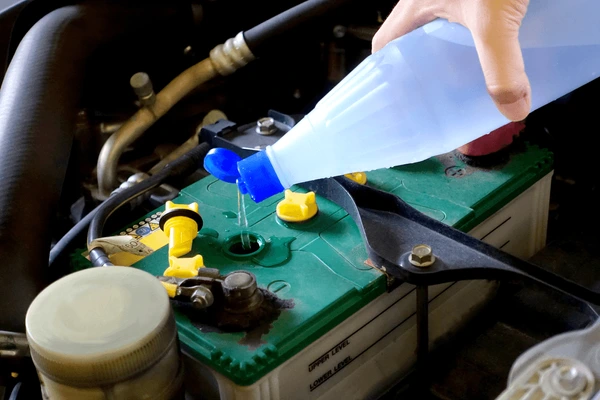
Internal Short Circuit:
Regularly check the battery for any signs of internal damage or short circuits, such as swelling, leakage, or peculiar noises. A short circuit must be treated urgently for replacement to avoid further damage or safety risks.
Age And Wear:
Observe the battery’s general performance regarding holding a charge and starting the car and change it when it is highly worn, poorly performing, or well over its typical 3 to 5-year service life. Regular maintenance checks may also indicate when the battery is approaching the end of its service life.
By addressing these issues, you are more likely to limit the noise to the barest minimum and make sure that your battery operates safely and efficiently.
How To Check Car Battery Fluid Level?
- Safety First: Wear gloves and eye protection before handling the battery.
- Locate the battery: It’s usually found under the hood, secured in a plastic tray.
- Identify the caps: Flooded lead-acid batteries have removable caps on each cell.
- Carefully remove the caps: Some caps might be tight, but avoid using excessive force.
- Checking the Level: Look inside each cell opening. On the side of the battery casing, filled lines should be marked.
The electrolyte level should be between the fill lines, ideally closer to the upper fill line.
Hearing The Liquid Inside Battery When Shaking?
The battery chemistry involves liquid SOCl2 and gaseous SO2. What you are hearing is bubbles of sulfur dioxide churning around with the liquid thionyl chloride. I recommend that you don’t shake them, and you will hear nothing.
Batteries Make Bubbling Noise
Bubbling usually suggests that the battery is producing hydrogen and oxygen gases through water electrolysis. This could happen when the battery is being charged, especially if it is already over-charged. These gases are explosive, and special care should be taken to provide adequate ventilation.
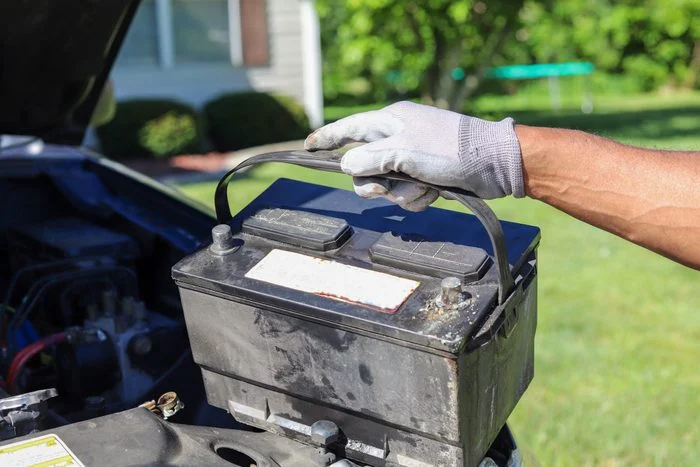
Sloshing Sounds Are Heard When The Car Is Off
Sloshing sounds are usually due to air bubbles in the cooling system. Less severe problems, such as having a clogged drain, require only minor fixes, which may include cleaning one`s drain. On extreme problems, like coolant leaks, you must replace worn-out gaskets and top up on coolant.
Water-Like Noise During Acceleration
The sloshing noise might be caused by air in the cooling system. If there’s air in it, it ends up in the heater core because it’s the high point in the cooling system. When you accelerate, the water pump spins faster, pumping coolant into the heater core. This forces the air out and causes the sloshing noise.
Dashboard Water Sound When Starting The Car
When you fire up the car, the water pump sends a coolant surge into the heater core, and voilà, you hear the sloshing. Obviously, air getting in means coolant getting out-you’re leaking somewhere in the hoses, the radiator, the water pump, or the engine.
Related Questions
Is It Normal For A Car Battery To Have Water In It?
Lead-acid batteries consist of lead plates fully immersed in a pool of electrolytes made up of sulfuric acid and water. The water is critical to how a lead-acid battery functions, allowing ions (electricity) to flow between the plates.
What Does It Mean When You Hear Liquid In Your Car Battery?
hat is sulfuric acid “sloshing” around inside, which is required for the battery to function, as it is known as a “lead/acid” battery and is completely normal.
Why Does My Car Sound Like It Has Water Inside?
The most common cause is a clogged drain trapping water in the heating and cooling system. The water, formed by condensation, usually empties onto the ground. However, a clogged drain can cause it to back up, leading to a sloshing sound and even dampness on the passenger-side floor.
Why Does My Car Battery Make A Gurgling Sound?
If the Battery bubbles, that usually means you produce Hydrogen and Oxygen (some call it HHO), which is explosive. It also usually means you lose water from the battery—you must check if it needs to be refilled. If the water gets too low, the plates in the battery will be exposed to air—not good.
Is It Normal For A Car Battery To Gurgle?
That usually means the battery has lost water, so you must check if it needs refilled. If the water level gets too low, the plates in the battery will be exposed to air, which is not good.
Why Does My Car Battery Sound Like It’s Boiling?
If the battery bubbles, it usually means you produce hydrogen and oxygen (some call it HHO), which is explosive. It also usually means you lose water from the battery—you must check if it needs refilled.
Can You Add Water To A Car Battery?
As more water is converted into hydrogen and oxygen gases, the water level inside the battery drops. This is why most lead-acid batteries must be “watered” periodically—distilled or de-ionized water added to the electrolyte fill well—to ensure proper function.
What Happens If A Car Battery Is Overcharged?
In most cases, an overcharged battery will eventually become ruined due to excessive gassing. With an older vented battery, the electrolyte boils away, ruining the battery’s plates. If your car has a newer, sealed-style battery, the battery may burst due to the internal buildup of gases.
Conclusion
In summary, hearing sloshing or bubbling sounds from your car battery can indicate several issues. The noise might stem from the movement of the electrolyte solution, overcharging, or low electrolyte levels. Overcharging can produce gases that lead to bubbling sounds, while low electrolyte levels can cause the remaining liquid to move more freely, creating sloshing noises. It’s important to maintain proper electrolyte levels, avoid overcharging, and handle the battery carefully to prevent these sounds.
